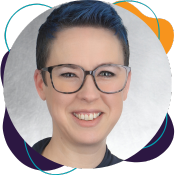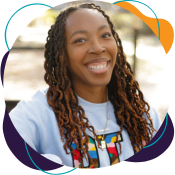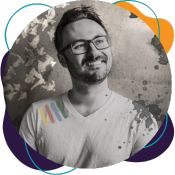Learn at Your Own Pace with Simple, Guided Lessons and Exercises that Turn Ideas into Action
$99 On-Demand Workshop
Launching Early 2026
As societal awareness around justice and equity continues to grow, this course emphasizes essential values such as altruism, equality, and justice—principles that guide professionals in promoting health across diverse populations. Incorporating the Participatory Occupational Justice Framework (POJF), the workshop focuses on empowering individuals through inclusive practices that respect their rights and dignity.
Participants will have the unique opportunity to learn from clinical experts and self-advocates who will illuminate the impact of bias on care practices. The workshop provides a comprehensive exploration of critical topics, including:
- the importance of anti-bias work for effective service delivery
- an analysis of ableism within various settings
- strategies for combating ableism, sane-ism, and
- other forms of discrimination
Attendees will examine intersectionality to understand how multiple identities shape individual experiences.
Participants will critically explore models of disability while applying trauma-informed, justice-focused, and culturally sensitive perspectives. They will select the model that best aligns with their practice ethics while integrating POJF principles to ensure that all voices are heard in decision-making processes. Participants will learn cultural humility techniques that foster respectful engagement with diverse populations and reflect on historical injustices affecting individuals today. Participants will learn cultural humility techniques that foster respectful engagement with diverse populations and reflect on historical injustices affecting individuals today.
By integrating reflective practices into decision-making processes, participants enhance their ability to deliver equitable care tailored to each individual's needs. This workshop synthesizes core principles with anti-bias frameworks to create inclusive environments that effectively address various client needs. This workshop will enable participants to move from allyship to accompliceship.
Investing your time in this workshop is not just about professional development; it represents a commitment to ethical standards that prioritize inclusivity and respect within your practice.
By learning how to avoid contributing to or perpetuating oppression—acknowledging that all areas warrant equal attention—we can dismantle systemic barriers together. Inaction is indeed a form of mass destruction; therefore, enhancing your skills while improving outcomes for everyone involved in caregiving is vital.
Register now and be part of this essential conversation!
Upon completing this fully online self-paced workshop, participants will be able to:
- Articulate the Importance of Anti-Bias Work in Sensory Health and Health Care for Neurodistinct Populations: Participants will explain why anti-bias work is crucial when supporting neurodistinct bodies and in sensory health work, identifying the difference between oppressive and emancipatory approaches within different frames of reference.
- Critically Examine Ableism and Develop Anti-Ableist Strategies: Participants will analyze how ableism manifests in therapeutic settings and identify actionable strategies to implement anti-ableist practices, informed by insights from the EMPOWER model.
- Apply Intersectionality Principles to Practice: Participants will explore intersectionality within therapy contexts, understanding that there is no hierarchy of oppression and recognizing how multiple identities shape client experiences.
- Utilize the Cultural Model of Disability as a Guiding Framework: Participants will be able to explain the cultural model of disability and analyze the benefits of application to practice, moving beyond historic-archaic views to foster inclusive approaches that recognize societal barriers.
- Develop Skills to move From Allyship to Accompliceship: Participants will differentiate between various forms of allyship—complicity, silence, performative actions—and learn practical skills necessary for becoming bona-fide accomplices within advocacy work.
- Cultivate Cultural Humility in Therapeutic Interactions: Through discussions on crossing cultures, participants will gain insights into cultural humility's significance and learn techniques for engaging respectfully with diverse populations while acknowledging their own biases.
- Synthesize Altruistic Healthcare Principles with Anti-Bias Frameworks: Participants will merge fundamental principles of compassionate care with anti-bias frameworks to cultivate more inclusive environments that effectively address the diverse needs of all individuals.
WHO SCHOULD ATTEND
Healthcare and education professionals, as well as caregivers, who want to better support neurodivergent individuals through neurodiversity-affirming, sensory-informed, and trauma-informed practices.
EDUCATIONAL LEVEL
Intermediate
Presenters:
Virginia Spielmann (she/her), PhD, OTR/L
Executive Director
STAR Institute
USA
Host
Virginia is a well-travelled speaker, coach and educator on topics including sensory integration, DIR/Floortime, child development and infant mental health. She has conducted trainings in Kenya, Australia, the Philippines, Vietnam, Hong Kong, and the USA and leads workshops at international conferences.
Virginia is a founder and former Clinical Director of SPOT (Speech, Physical, and Occupational Therapy) Interdisciplinary Children's Therapy Center in Hong Kong, where she led a large and widely respected inter-disciplinary team.
Virginia obtained her BSc in Occupational Therapy in Oxford England (2002) and her Masters in Occupational Therapy from Mount Mary University, Milwaukee (2018). She is a DIR/Floortime Training Leader and Expert and clinical consultant for the Interdisciplinary Council for Development and Learning (ICDL). Her extensive pediatric experience includes children on the autism spectrum, as well as those with Sensory Processing Disorder, infant mental health issues, adoption, developmental trauma.
Virginia has considerable post-graduate training, she is certified on the SIPT and is currently completing her Ph.D. in Infant and Early Childhood Development with an emphasis on mental health, with Fielding Graduate University, in Santa Barbara. She is a published author and contributed to the STAR Frame of Reference as part of the 4th Edition of Frames of Reference for Pediatric Occupational Therapy, alongside Dr. Miller and Dr. Schoen.
Diamond Rashad (she/her), OTD, OTR/L 
Occupational Therapist
A Dime of OT
USA
Dr. Diamond Rashad (she/her) is an occupational therapist with nine years of experience in sensory integration, pediatric feeding therapy, lactation support, and working with children and adolescents with neurodevelopmental and neurological conditions. She received her Master of Health Science in Occupational Therapy from Augusta University in 2016, and her Doctorate of Occupational Therapy (specialty in pediatrics) from Rocky Mountain University of Health Professions in 2019.
Dr. Rashad's expertise spans clinical practice, research, mentorship, and advocacy, particularly with research and presentations at national conferences on the topics of neurodiversity, maternal health, and cultural responsiveness. She currently serves as a Coalition of Occupational Therapy Advocates for Diversity (COTAD) Board Member. She continues to contribute to workshops and virtual courses focused on neurodiversity-affirming strategies, early intervention, and inclusive play for occupational and speech therapists.
Bryden Carlson-Giving (he/him), OTR/L 
Occupational Therapist
Neurodivergent Nexus
USA
Bryden is a neurodivergent and disabled occupational therapist working in the public schools, where he combines clinical expertise with lived experience to advance inclusive, anti-ableist practice. He earned his post-professional doctorate from Boston University, where he developed a toolkit to help OTPs challenge ableism in pediatric settings—work that led to the creation of the EMPOWER model, the first neurodiversity-focused occupational therapy framework. Bryden is the founder of Neurodivergent Nexus, an online hub for resources supporting anti-ableist OT practice, and the recipient of Boston University’s Emerging Leader Award. He is also the editor of Neurodiversity-Affirming Occupational Therapy: Empowering Approaches to Foster Neurodivergent Participation, out in March 2026.
